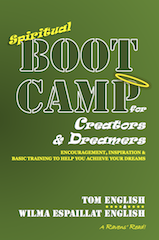
We dreamers and creators are always working toward a goal or dealing with a problem; waiting and hoping for answers and breakthroughs. Along the journey to realizing our hopes and aspirations we’ll encounter opposition and setbacks, and we’ll need to be able to endure delays and disappointments. Sadly, when “life happens,” it’s tempting to give up on our dreams and creative pursuits. If we want to stay the course and fulfill our destinies, we’ll need the backing, encouragement, comfort, strength, and reassurance that comes from One greater than ourselves. To get this Divine support, we’ll need some basic training.
Tap into the Power of Prayer
 There are countless books available on the subject of prayer, with more being published each year — and the number of volumes should indicate just how important this spiritual activity truly is. We’d like to offer a shorthand account here, that demystifies prayer and zeroes in on how it can aid creativity and help us to achieve our dreams.
There are countless books available on the subject of prayer, with more being published each year — and the number of volumes should indicate just how important this spiritual activity truly is. We’d like to offer a shorthand account here, that demystifies prayer and zeroes in on how it can aid creativity and help us to achieve our dreams.
Prayer is actually vital to the discipline of Abiding in the Lord (discussed on Monday). You can’t stay connected to a friend or family member without keeping in touch; and you can’t abide in God without staying connected and, hence, in constant communication with the source of your strength and creativity. Communication with God is called prayer. For many people, the act of praying is clouded in mystery, seemingly arcane and ritualistic. And yet, Jesus told His disciples that people should pray often. (Luke 11:8)
Prayer is just a fancy way of describing a heart-to-heart chat with God. We should talk to our Lord as freely and as easily as we’d talk to a best friend or soulmate, open and honest. No incense or Olde English required. Just open up to the Creator of the Universe; share your concerns, problems, fears, hopes and dreams. Bear your soul and spill your guts. Rant if you need to. The Lord is a good listener, and He takes in every word. And He loves you and wants the best for you, which is why He invites us to dialogue:

“Call to Me, and I will answer* you, and I will tell you great and mighty things, which you do not know.” (Jeremiah 33:3 NASB)
*God responds in a variety of ways: through His Word (the Bible); through the “still, small voice” of the Holy Spirit (who resides in all believers); through other people; through events and circumstances. So, really, prayer is a dialogue — even if you don’t hear an audible voice.
If you can talk, then you can pray. If you have laryngitis, you can still pray, silently, with your thoughts. Unfortunately, many people remain timid about approaching God in prayer. They act like a shy schoolboy who’s trying to find the words to talk to the new girl in class. These folks are rarely at a loss for words; but once the “big moment” arrives, they suddenly don’t know what to say. Even the disciples weren’t sure about what to say. They asked Jesus, “How should we pray?”
- Prayer is Not Rocket-Science. Nevertheless, Jesus gave His followers some simple guidelines in the form of “The Lord’s Prayer” (Matthew 6:10-12); which still provides a nice blueprint for conversing with our Heavenly Father. If you not sure how to begin a conversation with God, this “sample
 prayer” is an excellent icebreaker. It’s a good idea to memorize it, along with Psalm 23, another handy Biblical prayer.
prayer” is an excellent icebreaker. It’s a good idea to memorize it, along with Psalm 23, another handy Biblical prayer.
Actually, all of the Psalms make great prayers. Because King David wrote each one as a sort of “open letter” to God, in which he poured out his heart to his Lord. Within these “written prayers” David the Giant Slayer expressed his love and gratitude for God. He also shared his problems and fears. And he often cried out for help. David was both a creator and a dreamer who faced the same types of problems and challenges we all face, so his psalms can be recited to God as our own prayers.
Furthermore, David’s attitude toward God and his habits concerning prayer provide us with a model for this important spiritual discipline. The Psalmist is described in Acts 13:22 as a “man after God’s own heart.” Was David perfect? No, but he was careful to keep God as his first love and #1 Priority. And he daily demonstrated this deep affection and commitment by also making prayer a priority.
- Prayer Should Always Be a Priority. That’s why King David wrote, “Early will I seek Him.” (Psalm 63:1) The Psalmist knew that — in the course of leading an army, running a government, and overseeing the various needs of a kingdom — he was bound to get busy … and sidetracked … and forget
 his commitment to talk to God. Meeting with his Lord “early” in the day was David’s way of ensuring he made time for prayer, before he got involved with other concerns.
his commitment to talk to God. Meeting with his Lord “early” in the day was David’s way of ensuring he made time for prayer, before he got involved with other concerns.
What’s “early”? Well, “early” is relative to your schedule; it’s not so much an hour of the day as it is a slot near the beginning of your personal routine. If you work nights, and go to bed around the time most people are having breakfast, then your “early” could be sometime in the afternoon — right after you wake up and before you get involved in other matters. Whether early in the day or early in your schedule, the meaning is the same: “first thing”!
Making prayer a priority (the priority, because it’s about meeting with God) means setting aside a special time for it, and making it the first thing we do, before we have breakfast, check our email, or tune in to the local news and weather. Never put off prayer till later, because “later” never comes.
Furthermore, prayer helps set the tone for the entire day: it empowers you, improves your outlook, sweetens your disposition, and jumpstarts your creativity. Skipping prayer is worst than going to work without a good breakfast, especially on those days when you wake up feeling anxious or apprehensive: “Do not be anxious about anything, but in every situation, by prayer and petition, with thanksgiving, present your requests to God. And the peace of God … will guard your hearts and your minds….” (Philippians 4:6-7 NIV)
- Pick a Prayer Place. Just as we need a “creative space” (a quiet little corner in which we can work and dream without interruption), we also need a specific and similar spot where we can daily meet and chat with the Lord. Your “prayer place” could be at the kitchen table (before the kids wake up), or a nook in the den, or even a folding chair set up in the laundry room. What’s important is that you designate a single spot where you’re comfy — but not comfortable enough to fall back asleep — and have relatively peaceful surroundings.

If possible, stash your Bible (and any devotional materials you use) somewhere in or near your Prayer Place. This can save you time and frustration, because you won’t be hunting for it every morning. Another good idea, especially for dreamers and creative people, is to keep a notebook (or prayer journal) because God will give you new ideas and insights. You’ll probably want to jot these down.
Although it’s possible to pray in a variety of places and at different times, designating a special spot in your home — and a special spot on your schedule — will help you to develop a routine. And having a routine is vital to creating healthy habits, whether the habit is going to the gym, eating a sensible diet, or spending quiet time with God. Such habits, according to experts, require about three weeks to really stick — so stick to a routine of daily prayer!
- Keep the Prayer Lines Open. The Word of God admonishes us to “Pray without ceasing.” (1 Thessalonians 5:17) A different translation renders the phrase as “Continually be prayerful.” (NIV) Being prayerful is to be involved in and characterized by prayer. Meaning? God wants us to stay in touch throughout the day, uttering prayers and making requests whenever and wherever the need arises. Which means you can chat with God on the
 way to work, at your desk in school or the office, and even while standing in line at the movies. We do suggest, however, that you keep these conversations a little on the quiet side — just between you and your Lord.
way to work, at your desk in school or the office, and even while standing in line at the movies. We do suggest, however, that you keep these conversations a little on the quiet side — just between you and your Lord.
Tapping into the power of prayer will bring comfort, joy, peace, answers, and understanding. It can also energize your creativity — and with God’s help, you can fulfill even the most “impossible” dreams. Just remember, “I am the LORD, the God of all the peoples of the world. Is anything too hard for Me?” (Jeremiah 32:27 NLT)
